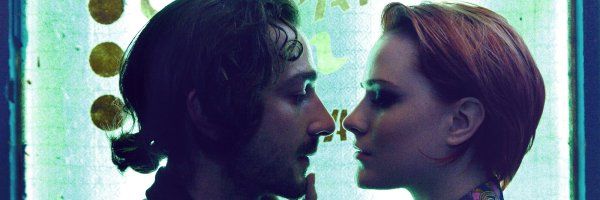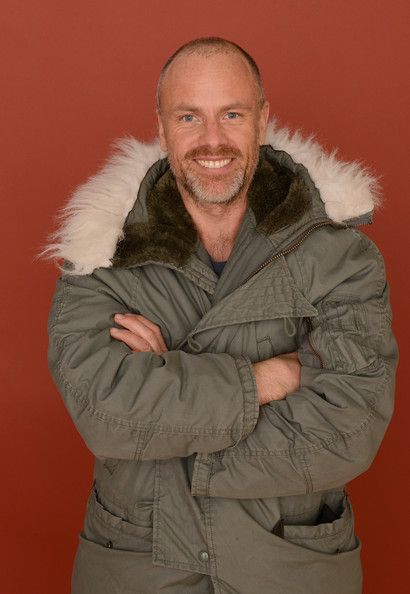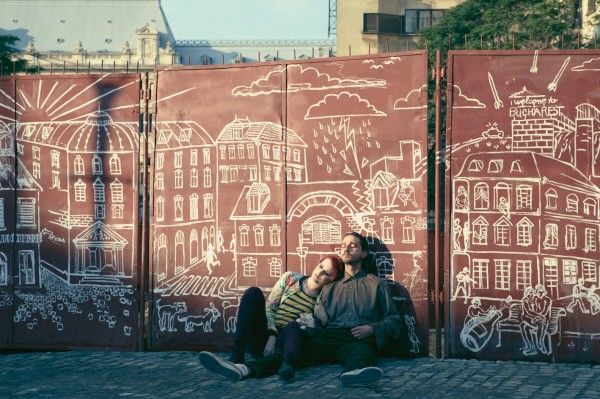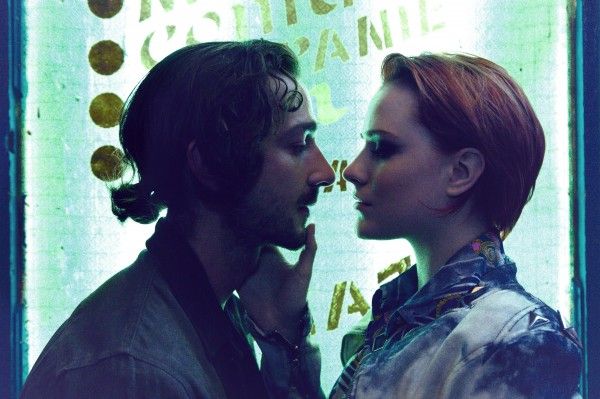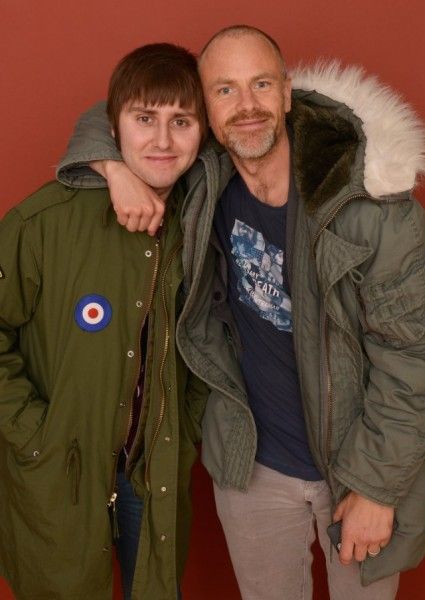The Necessary Death of Charlie Countryman is director Fredrik Bond’s first feature film. Premiering at the 2013 Sundance Film Festival, it stars Shia LaBeouf and Evan Rachel Wood as a couple who meet under strange circumstances and have an impossibly strong mutual attraction. As LaBeouf’s character Charlie falls for the beautiful and grieving Gabi, he gets caught in the sights of her dangerous husband (Mads Mikkelsen) and his life comes into immediate and grave danger. The film feels like a modern fairy tale story of love and pain colliding set in the gritty world of Bucharest, Romania. It also stars Til Schweiger, Rupert Grint, James Buckley, Vincent D’Onofrio and Melissa Leo.
Shortly after the premiere of the film, I was able to sit down with director Fredrik Bond to discuss the film. We were then pleasantly surprised to be joined by star James Buckley (The Inbetweeners) for the remainder of our 30 minute interview. They discussed filming in Budapest, the unique look of the film, the closeness of the cast and gave me hints at what’s coming up next. Click after the jump to read the whole interview.
Collider: First, for people who won’t see this film for a while can you tell them in their words what the film is about.
Fredrik Bond: The film is about a young man who loses his mom to cancer in the beginning of the movie in Chicago. And he goes on a trip, on a self-discovery journey after, for the grief of his mom by going to Eastern Europe. And falls in love with Gabriela and has a bit of a love adventure in Bucharest. Has a big love adventure in Bucharest.
This film obviously has a very unique, stylized look to it. Were there filmmakers that you were trying to emulate? What filmmakers and which genres influence your style?
Bond: Well, I think I’ve always admired sort of dynamic filmmakers, which doesn’t shy away from strong expressions. Which might be a little more theatrical at some points. So like, in France, Leo Carax, who did Lovers of Pont-Nerf, of course Tarantino. Swedish director Roy Andersson who did one of the most beautiful love stories in 1970 called A Swedish Love Story. Um, and Danny Boyle, Danny Boyle has been a huge, has had a huge effect on me. His movies, early movies like Trainspotting and those movies. So I’ve always loved the energies of those movies. But also, that they are very focused on the characters. Cause it’s not only gimmickery, it’s not only about visuals. You feel a real need, a love for the main characters. So that’s what I’ve always loved about watching movies myself. And of course that’s Luhrmann. His Moulin Rouge! is incredible, his Romeo + Juliet. Wow. You know. When I saw those, those really were transformative films for me.
Music plays a really big role in this film obviously. Do you think your experience in directing things like commercials and music videos influenced that?
Bond: I think that yeah, since I’ve been working with music videos and commercials, they are naturally very music driven and visual driven. So that feels like my natural element to be working with that. But in feature films, I also, I was worried that it was going to be too gimmickery, that it was going to be too much, too much music, too much visual flare and not letting the actors shine through. So it was always a balance for me to work with, to let the characters really take the main focus of the film and the story. And that’s what I love about the filmmakers that I mentioned, is that it’s visual but it’s also, you see that the characters are the most important thing. The actors are the most important thing. Cause if you don’t, I’m like, if I don’t care about a character, I fall asleep within five minute, when I watch movies. If I don’t care 100% about the character, I fall asleep. So that was fundamental for me, yeah.
Film or digital, and why?
Bond: Uh, I think, I think um...I think digital. I think digital and I was terrified about it for a long time. But I think digital because it gives so much more freedom to work with the actors. Cause when you’re working with film and you hear that mag starting to roll and you know that there’s thousands of dollars just spinning around, it’s another stress element, which I don’t enjoy at all. Cause I love when the actors, and especially when you work, I was so lucky to be working with amazing actors like Shia and Evan and James Buckley and Mads Mikkelsen and Rupert Grint and Til Schweiger and those guys, so you really want to make sure that they, that I don’t have to shut off the camera because I’m running out of film or it becomes too expensive. So in that way you’re so liberated to work with digital. But it’s still... when you see Paul Thomas Anderson’s The Master and it’s shot on film at 75mm it’s...you know. It’s hard to compare. But I still think that digital is close enough, and I think it’s getting closer and closer to be...there’s no doubt it’s going to be taking over completely unfortunately.
Then you shot this on digital.
Bond: We shut this on digital, yeah.
On what camera?
Bond: The Alexa.
And how long was your first assembly cut?
Bond: My first...believe it or not, my first assembly cut was actually one and a half hour. Cause I wanted to make a short, snappy movie. I wanted to make it very...but um, cause I didn’t want to fall into the trap of having to kill too many of my darlings, I wanted, when I had to cut scenes, to cut down, so I actually went the other way around. So my first cut was really short, and instead of taking away things, I was adding things more and more. Which was giving more space and room for certain things.
Well I was going to ask you about seeing an extended cut, but are we gonna see the shorter cut on the DVD?
Bond: No, no, I think we’re going to see the extended cut on DVD. But I know, because, this was my first movie experience but you always hear about directors coming in with a cut that is two and a half or three hours long and then there’s a big battle over which scenes to cut and what to do. So I didn’t want to go that way. I wanted instead to add stuff that I felt became more and more necessary.
What was cut then, what was deleted? Were there deleted scenes?
Bond: There was deleted scenes. That was primarily because we needed to get to Bucharest earlier in the movie. So we had a little bit longer setting in Chicago, in the Chicago part of the movie. But that was about it.
But we’ll see those on the DVD?
Bond: I hope so. Yeah yeah yeah I hope so.
Was it always Bucharest that you were going to film in?
Bond: Um, yes... I mean no. It wasn’t...originally the movie was actually set in, the script was actually set in Budapest, but then I really wanted to find a city which hadn’t been explored that much, and that we hadn’t heard so much about. And I wanted to make a fresh love letter to a city that was new to Charlie and new to the audience as well. And when we went to scout in Bucharest I just fell in love with the homeless dogs on the street. The largest population of homeless kids in the city, and just what they’ve gone through as a nation. What the city has gone through with dictatorships and corruption and stuff. It just struck a chord in me that I felt very passionate about, that I felt was perfect for the movie.
How did the history of that city influence the way that you shot there? Was it difficult to shoot, were they welcoming to you?
Bond: No, they were super welcoming. You know, they were, if anything, almost easier a city to work with than any other city I’ve worked with. Because they’re so hungry. That was also, you want to work with hungry people that are passionate about...so when they knew that we were doing a love letter to their city, it was like wow. Yes. We will do anything to help. And like a lot of other productions just come there to use it as, for another city. But we were actually making it Bucharest for Bucharest. So they loved that we were, I think we’re really running with their energy of loving that.
What do you think is the message behind this film? What do you hope people take away from it when they see it?
Bond: That love prevails everything. I think that it’s...the movie’s really about grief, overcoming grief. And I’ve personally gone through grief myself, in terms of losing somebody very close to me, who’s still alive actually but losing still. And so that’s something that hopefully can resonate with a lot of different people I think we all have grief in different incarnations in our lives. I think if anything, if it’s short and sweet, love prevailing over grief.
(James Buckley enters and sits down next to Bond)
Bond: And his grief was working with me.
James Buckley: I’m not sure what that means.
Well welcome. Now that both of you are here, I want to ask about your [Bond’s] experience working as a first time director and your [Buckley’s] experience working with a first time director of a feature?
Buckley: There wasn’t...there wasn’t...
Bond: Go on, you can tell me. Be rough.
Buckley: There wasn’t like a feeling of a first time director. Fredrik’s very experienced and has been a director for a long, long time and he’s...there wasn’t one point when I was thinking when I felt...it was a great experience. It was lots of fun from the moment I got an email from you. It was just wow, this guy is really enthusiastic. It’s just infectious, he creates a very fun place to work. Makes you feel very comfortable. Listens to suggestions. Explains what he wants as well. And these are all things you need to be a great director, so that was my experience working with you.
Bond: Well mine as a first time director was so interesting to work with such a different caliber of actors that work so differently from...we would do certain takes per scripted and then James is amazing at improvising which is a gift that you just have to utilize and work with because these diamonds just fly out of his mouth constantly. So I think there’s, how many actual killer lines that you delivered and gave? But it was a lot. I think as a first time director, as a director anyway in general, you just have to be receptive to different ways that people work and try to see where people shine the most and cater to that.
Buckley: But it’s great to be able to, because I do like improvising a bit, taking things in a different way and trying to get a different reaction, just trying to get a joke in every second. I love doing that. But there’s only certain places that you feel comfortable you can actually do that. A lot of directors, I don’t think they give you that confidence, you feel a bit limited to feel free enough to do something like that. So when you get a guy who really builds you up, really think ‘oh ok I might actually be doing a good job here’ that really makes you think your performance is just, that’s invaluable, that’s everything. That’s what you want from a director.
Bond: The first scene, with you guys in the hostel room, there’s a lot of improvisation there. And in the nightclub. There’s some great stuff there, really great stuff that we also realized that ‘that might not work as well’ and we wrote alternative lines, and then he would come with his genius thoughts and sort of gave it a new life and made it work.
What was it like, the atmosphere on set working with the other actors? People like Shia LaBeouf and Evan Rachel Wood who’ve worked on very big other projects with big name directors?
Buckley: That was one of the reasons why I wanted to do this film, because it had great people involved already so that’s a draw. Also on the flip side yeah, it is very daunting because it’s...you know, I’m famous in Britain which is like...not really...
Bond: It’s like Florida, isn’t it?
Buckley: There’s like three...there’s about four people in Britain. So.
Bond: Britain is pretty big. I’d like to remind you. You still have 56 million.
Buckley: So it became somewhere people didn’t really know me. I didn’t really have a name for myself yet. That was daunting but exciting. The thing is, then you work with Shia who’s really down to earth. He’s just like, back home you’d call him ‘a normal bloke’. You know, there’s nothing pretentious about him, he’s just a real sort of straight guy, and he was really up for it and mucking and getting muddy and getting involved. Nothing difficult, there was no like ‘he needs a bigger trailer’ or anything like that at all. He’s the complete opposite of anything like that, which straight away makes you feel really comfortable. And he’d say ‘oh how’d you feel this one going, this scene gong?’ You think, this is an amazing experience, and I’m really pleased that I got offered this part.
Bond: When everybody started working it was like being creative people, all the ‘celebrity’ part of it disappears out the window, it’s about here and now and what we’re working completely. And you know the whole cast that we had was exactly like that. Shia didn’t come with an assistant, Evan didn’t come with an assistant, it was just about the work. It was just getting it, and Mads Mikkelsen the same thing.
Buckley: And Rupert the same thing.
Buckley: I keep forgetting that he’s a mega, mega star.
Bond: Me too!
Buckley: It’s so easy to just forget that. Cause you just talk to him and he’s just so nice and so fun to be around, like you go for a beer with him afterwards and stuff and he’s just again, he’s just a bloke. And then you forget that his films have just smashed every record that exists and that everyone on the planet knows who he is. It was really lucky, it was so great that everyone was on the same page and wanted the same thing.
Bond: It was just a big happy family.
Buckley: No it really was.
Bond: Yeah there was sex every night. You and I had an incredible time. (They laugh)
Buckley: Oh god yeah!
I’m printing this you know. That’s on the record.
Bond: No, but you have to add the laughters! The foundation of that is that everybody, we had a script in our hands that we were crazy about making. And everybody wanted to make this script. So nobody was there for other reasons than love for Matt Drake’s script.
Did you have a favorite scene to shoot?
Buckley: Most of the stuff with Shia and Rupert, the three of us together was just like...
Bond: There’s passion and there’s arguments but it’s for the good, because we’re doing this script. So it’s not like it’s smooth as as a banana, you know?
Buckley: Smooth as a banana?
Is that a saying?
Bond: I think so.
Buckley: It’s a new one. Tweet that. Hashtag smooth as a banana.
Bond: But it’s all coming from a good place. Creative place.
From what you’re saying it sounds like a lot changed from the original script, is that true?
Bond: No...does it sound like that?
Well you’re talking about improv and things that went in new directions...
Bond: I mean we’re talking small...in the big scheme of things—
Buckley: We always knew where we had to get to. And what happened in the meantime, we just messed about with how, and had a little bit of fun, a few different takes and some stuff probably was a bit too odd and a bit too weird but it was great being on a set where you felt comfortable enough to just try something. If it doesn’t work out we do something else on the next take. It’s been definitely the most rewarding thing I’ve done as an actor so far, in my career. I really felt part of the film, whereas sometimes you just feel like a guy who’s hired to be there. So it was great.
Bond: I feel the same. Like a guy who was hired to be there. It was my best film so far.
Buckley: Definitely. It definitely is your best film so far.
Bond: But no, it was a tight schedule, so we had sort of wiggle room to try certain things in certain ways but otherwise we had a pretty, we had a pretty set plan for where we were heading. So it might sound like we were wish-washy but we—
Buckley: We still took it very seriously. And very professionally. That’s another thing as well that people like Shia bring to the table, that they’re just so, like Shia’s just so- he’s just the film. When I was talking to him I was like ‘have you got anything else after this?’ just having a conversation. And he’s like ‘no no, I have one thing, I like to just concentrate on that.’ And he froze himself so completely into it. So passionate.
Bond: You know, I didn’t see Shia on the cell phone once in the time during the whole production. He never brings up the phone. And I think it was kind of the same thing with all the actors. Everybody was so committed. Mads Mikkelson is like, he’s also the character when he comes there, he’s amazing. So I think all the actors inspired each other.
Buckley: It’s very infectious, when talking to Shia about it, how he goes about stuff, I said to him ‘yeah when we cut, I’m going to go speak to my wife, speak to my son and I can’t be this druggie backpacker.’ So we have a sort of slightly different, we disagree about when the day ends maybe. Apart from that, what an amazing way to go about your business, to just be so focused on the film, so passionate about the film and...I know Shia’s got a bit of a record of being maybe difficult but that’s weird, that’s really strange, because—
Buckley: I think so, yeah. That’s what I’ve been told. But he only ever does things that he thinks will make the film as great as it could possibly be.
Bond: He’s the truth police.
Buckley: That’s exactly correct. You take from his lead too, he’s a real leader in this film. And I think everyone did. Everyone took from his example and then we would be like ‘I don’t really believe this.’ Because I’m British as well and it was written by an American, so things like even just certain words don’t sound correct coming out of my mouth. So being able to say like ‘I wouldn’t really say that, that’s sort of an Americanism’ and Shia sort of gives you the confidence to be able to do that. His whole work ethic is contagious.
Very quickly,what’s next for the two of you?
Bond: I’m looking at a couple of things that I’m excited about but nothing has been decided. So I’m enjoying the festival right now, and then we’ll see what happens in the spring.
Directing?
Bond: Yeah. Not acting. I’m the director, not the actor.
Well maybe you tried features, you don’t like ‘em.
Bond: No, I mean I love this. This is what I do.
Good. And for you?
Buckley: Hopefully, I finished a film last year, again something completely different to what I’ve done before, it’s a thriller. A horror. Actually I don’t even know if I’m allowed to talk about it, because there’s a big studio involved and I think they might sue me.
Bond: Well we’re going to Berlin with this also. To the Berlin festival with this film, we’re in competition there as well. So that’s going to be the next couple weeks.
Click here to catch up on all of our 2013 Sundance Film Festival coverage thus far.

